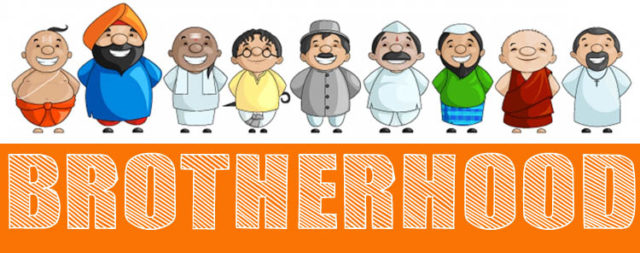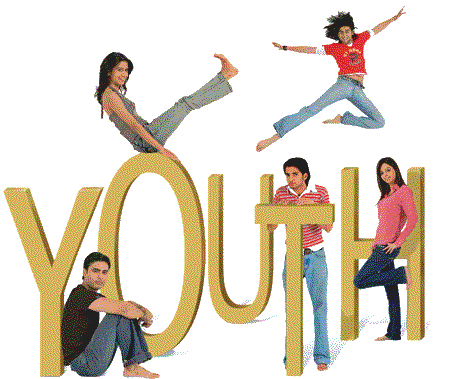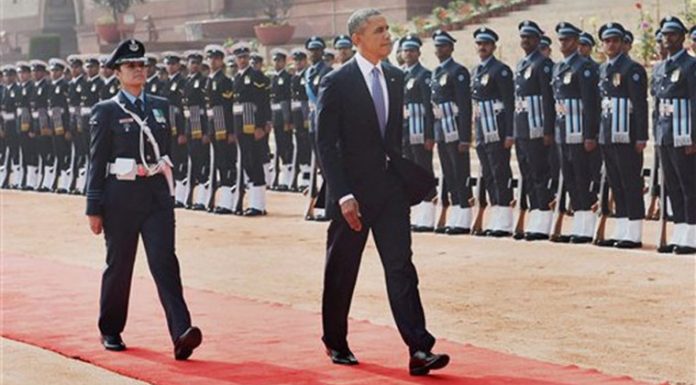Brotherhood is defined as a feeling of friendship, support and understanding between people. The hindi word bhaichara sounds even better, of course, implying something beyond, a feeling approaching harmony.
To understand the role of Youth in promoting this feeling in India, it would be instructive to look at how our country has shaped up since its formation. Remember always that the land we now call India has been one of deep divisions. With rare exceptions, it has comprised of dozens, if not hundreds of independent kingdoms in a feudal system. Territorial borders apart, the lines of caste, community and religion have always been present. Even at the best of times, the various communities have lived in ‘tolerance’ of each other, rather than understanding, their mutual dislike contained by the walls built, physically on the ground as well as in their occupations and roles in society. Add to this the wounds of partition and it is safe to say that India at its birth was as segregated a society as any former colony gaining independence.

The only binding factor for the nation had been the struggle for freedom from British rule, and the efforts of the early governments of India were to build on this feeling. Nationalist sentiments were easy enough to foster, and the film industry certainly was a part of the endeavour. A look through movies produced throughout the period from independence to the early nineties will show a conscious emphasis on highlighting friendships and romance between characters of different faiths and communities, in spreading a message of equality and breaking down of the caste and language lines.
So where did that sense of brotherhood start to fray? It would be easy to point fingers at the disaster of late 1992 and early 1993, the retaliations, the pogrom of 2002, but the fact is that this is not a subject where identification of root causes will help solve the underlying problem. We have reached a stage where too many people identify more closely with a narrow definition of ‘self’ – with a caste, a region, a religion, a food preference, a language – than with the nation as a whole, and more with the nation than with the larger mass of humanity. Once again, it might be easy to lay the blame for this at the doorstep of politicians who have exploited these divisions, often to rich electoral benefit, but in a sense they have been heralds of change rather than agents. The divisions have been too deep-rooted, the latent hatred too strong, an innate fear of the ‘other’ too ingrained in our minds to let go.
What role then, can the youth play to bring about a positive change in society? To promote a sense of ‘brotherhood’.
Firstly, as the most educated generation in the nation’s history, the youth need to realise that true progress lies in recognising the importance of working together to achieve national goals. A nation cannot be come great, or a super-power, or whatever term is in vogue at the moment – leaving behind significant portions of its population. Economic growth means little by itself when our minds are still stuck in the fourteenth century. A country were Gods and cows are still worshipped by sacrificing human beings is not a country where development is happening.
Secondly, the youth must inculcate a sense of self-reliance. Older generations fell prostrate before Gods and god-men, saints and scoundrels, politicians and actors, forgoing their own pride and belief in being in control of their fate. It is for the youth of India to know better, to realise that no messiah will lead them to a Promised Land, that no superstar has all the answers, and that even Gods are fallible when they are served by human servants. It is in ourselves and our intrinsic qualities that we need to trust, and perhaps then we will realise that none of us are very different after all.
Thirdly, the youth of India need to engage in politics in a more meaningful way. Presently we see a fear amongst the young to engage in active politics, preferring either to be indifferent or stick to social media interaction. On the contrary, the youth should speak up for their rights, for equality and upliftment of the masses – or in favour of suppression of rights, lopsided development and maintenance of the status quo, but whatever the case, they must speak out. Only by making your voice heard, and hearing those of others like you, can a person understand different points of view, rather than being set in the ways and views held since childhood.
The youth are the future of the country and of humanity. The generations that preceded them have spent lifetimes pondering the differences between people, using those differences to create hatred and increase the wedges between people. It is for the youth to find the common ground and bring about a world where brotherhood will be a reality and not a distant dream.































